Are you considering a new TV for your home but struggling to decide between LG and Samsung? Both brands are highly regarded, yet they offer distinct features and technologies that cater to various viewing preferences. However, they each bring unique features that cater to different viewing preferences and needs. This comprehensive guide on LG TV vs Samsung TV will delve into critical aspects such as screen technology, operating systems, display quality, audio features, and more.
By examining these factors, you’ll be better equipped to determine which brand aligns with your entertainment goals. The table below includes the comparison parameters of both TVs.
| Parameters | LG TV | Samsung TV |
|---|---|---|
| Screen Technology & Size | Features OLED, NanoCell, LED, IPS, UHD, and QNED options, with sizes ranging from 27 to 120 inches. | Utilizes QLED and Neo QLED panels, with sizes spanning 32 to 98 inches. |
| Operating System | webOS and NetCast OS with a streamlined, minimalist design, quick updates, and extensive app accessibility. | Tizen OS is feature-rich but with a more crowded interface. |
| Ease of Navigation | Customizable app layout, smooth transitions, and easily accessible Quick Settings. | Grid layout for apps, with Smart Hub and Multi-View features for content management. |
| Display Quality | Offers 4K/8K resolution, Dolby Vision, and AI Picture Pro for outstanding clarity. | Provides Quantum HDR, focusing on brightness and contrast optimization. |
| Audio Features | AI Sound Pro adapts settings, and Dolby Atmos offers rich, immersive sound. | Object Tracking Sound offers directional audio, enhancing the viewing experience. |
| Connectivity Options | Multiple HDMI 2.1 ports, Bluetooth, WiFi, eARC support, and Ethernet. | Limited HDMI 2.1 availability, Bluetooth, WiFi, Ethernet, and eARC support |
| Smart Features | ThinQ AI with built-in Google Assistant and Alexa for seamless smart home integration. | Bixby and SmartThings integration for smart home device control. |
| Gaming Performance | OLED models offer low input lag, HDMI 2.1, VRR, and G-Sync support for smooth gaming. | LED models support low input lag, HDMI 2.1, VRR, and FreeSync technology for gamers. |
| Design | Ultra-thin OLED models with minimal bezels for a modern, sleek aesthetic. | Slim QLED models with unique designs like “The Frame” focus on both style and function. |
| Remote Control | Magic Remote with point-and-click functionality, ThinQ app for virtual control. | Minimalist remote with voice assistant support, SmartThings app for additional control |
| Pricing and Warranty | Higher-end OLED models have pricing reflecting superior quality and up to 3 years of warranty. | More budget-friendly QLED models, providing value at various price points with 1-3 years warranty. |
| Customer Support | Available 24/7, except on holidays, with phone, live chat, and website resources. | Available daily from 8 AM to 8 PM, offering similar live chat, phone support, and web page. |
| Purchase Link | Buy from Amazon | Buy from Amazon |
LG TV vs Samsung TV – Screen Technology & Size Availability
LG and Samsung both provide a range of screen sizes and advanced panel technologies, but each has its own strengths that appeal to different types of viewers.
LG TV
- LG’s OLED Technology is renowned for its deep blacks and vibrant colors, offering an unparalleled viewing experience.
- It also features NanoCell, LED, IPS, UHD, and QNED models, catering to diverse preferences in picture settings.
- Available in a wide range of sizes. It starts from 27 inches and goes up to over 120 inches, making them ideal for any setup, from small rooms to home theaters.
Samsung TV
- Samsung primarily relies on QLED panels, which provide brilliant color performance, though they can’t achieve OLED-level blacks.
- Neo QLED technology improves brightness, making it especially suitable for brightly lit rooms.
- It offers screen sizes from 32 inches to 98 inches, covering most space in your room.
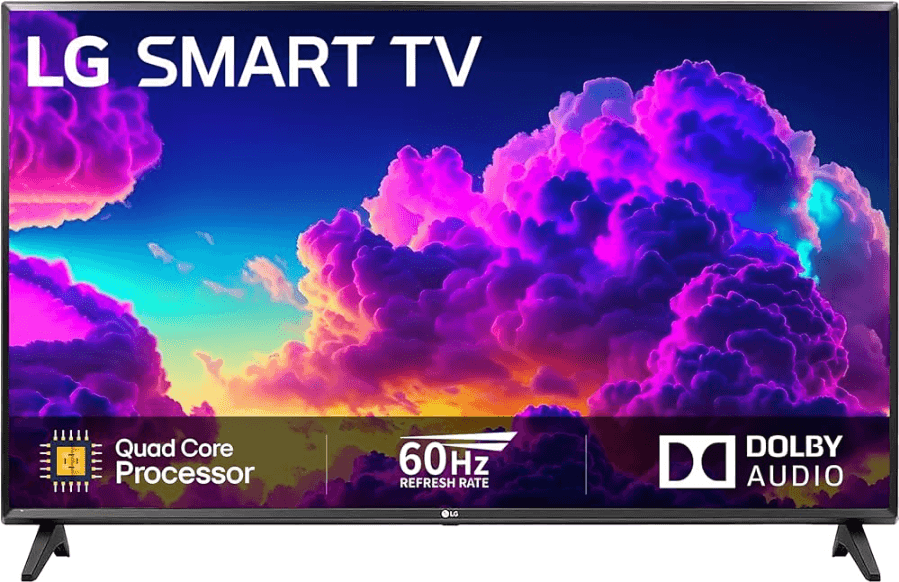
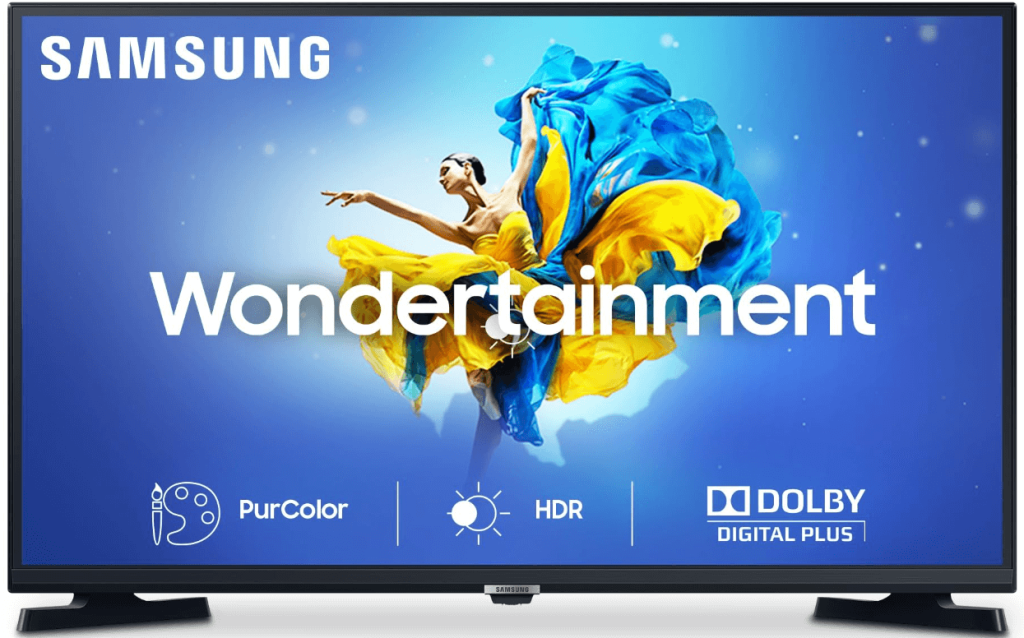
Winner: LG TV
Reason: LG excels with its OLED technology and offers a broader selection of screen sizes, making it the better option for those looking for cinematic picture quality.
LG TV vs Samsung TV – TV Operating Systems
The operating system is key to delivering a smooth and intuitive user experience. LG’s webOS and Samsung’s Tizen each provide different approaches to managing apps and settings.
LG TV
- The webOS interface is known for its minimalistic design, providing a seamless and user-friendly experience.
- LG updates webOS regularly, keeping it fast and responsive with new features.
- Its app store offers a broad selection, and streaming apps are easily accessible from the home screen.
Samsung TV
- Samsung’s Tizen OS offers a feature-rich interface but may feel a bit crowded in comparison to webOS.
- Similar to LG TV, Samsung TV also frequently releases updates over the OS for quick and intuitive functions.
- Tizen supports a wide variety of apps, although some users find navigating between them less smooth.
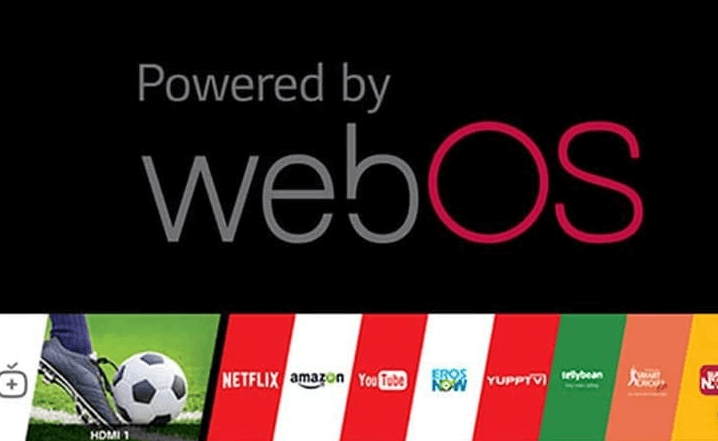
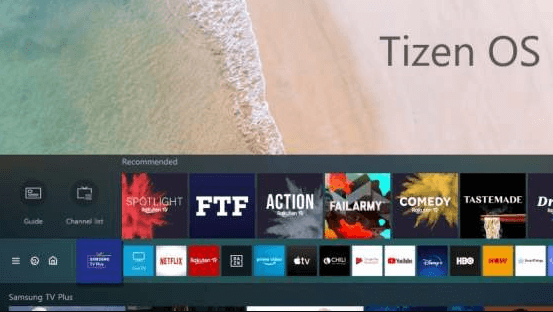
Winner: LG TV
Result: LG’s webOS stands out with its intuitive design and easy navigation compared to Samsung’s.
LG TV vs Samsung TV – Ease of Navigation: User Interface
The user interface (UI) of a TV is a critical element that shapes how efficiently you can navigate between apps, adjust settings, and personalize your viewing experience. Both LG and Samsung offer user-friendly interfaces, but they take slightly different approaches.
LG TV
- LG’s webOS allows you to customize the layout to prioritize the apps you use most.
- The interface offers smooth transitions, minimizing any lag between app selections.
- Quick Settings are easily accessible, letting you adjust picture or sound settings without leaving your content.
Samsung TV
- Samsung’s Tizen OS presents apps in a grid format, making it easy to see multiple options at once.
- The UI is designed to provide rapid access to apps, though some users find it less fluid compared to LG’s interface.
- Tizen includes Multi-View and Smart Hub, which allows you to view two sources at once or quickly access content across various streaming platforms.
Winner: Samsung TV
Reason: While both interfaces offer customization and easy navigation, Samsung’s Tizen OS stands out for its smoother transitions and streamlined design, making it the more user-friendly option.
LG TV vs Samsung TV – Display Quality and Visual Performance
Picture quality is a vital consideration when choosing a TV. While both LG and Samsung TVs provide excellent displays, their technologies produce distinct visual experiences.
LG TV
- With 4K and 8K resolutions available, LG provides top-notch sharpness and clarity.
- Features like Dolby Vision and AI Picture Pro adjust brightness and detail for optimal viewing.
Samsung TV
- Provides sharp detail and clarity, making it suitable for a variety of content.
- Features technologies like Quantum HDR, which optimizes brightness and contrast for a dynamic viewing experience.
Winner: Samsung TV
Reason: Even though both TVs offer the best picture quality, the Samsung TV steps ahead by making it the top choice for those focused on resolutions and features.
LG TV vs Samsung TV- Sound and Audio Features
Sound quality is one of the important features of a fully immersive experience. Both TVs incorporate advanced audio technologies, and each brand takes a different approach.
LG TV
- LG’s AI Sound Pro adapts audio settings based on the type of content being watched, offering tailored sound.
- Dolby Atmos integration provides a rich, three-dimensional audio experience that is especially suited for movies.
- LG also includes adjustable sound modes to enhance dialogue or emphasize surround sound.
Samsung TV
- Integrates Object Tracking Sound technology, which creates a more directional audio experience based on the on-screen action.
- It offers good audio quality for general viewing, making it suitable for everyday use.
- Compatible with various soundbars and external audio systems for enhanced sound.
Winner: LG TV
Reason: LG TV’s AI Sound Pro and Dolby Atmos integration deliver a superior audio experience to Samsung TVs.
LG TV vs Samsung TV – Connectivity and Ports
The compatibility of modern devices relies on the TV’s connectivity options. The LG and Samsung TVs offer a wide range of ports, wireless support, etc, but there are key differences in their connectivity approach.
LG TV
- LG includes multiple HDMI 2.1 ports, which are critical for next-generation consoles and high-speed data transfer.
- Standard Bluetooth and WiFi connections make it easy to pair with a variety of devices.
- The Ethernet connection ensures the fastest internet.
- eARC support ensures premium audio quality when connecting external sound systems.
Samsung TV
- Samsung offers several HDMI ports, though HDMI 2.1 support is more limited across its models.
- Like LG, Samsung provides Bluetooth and WiFi for seamless wireless connections.
- For wired connection, Samsung TV offers Ethernet support.
- In some selected Samsung TV models, the eARC support is opted for for better audio quality.
Winner: LG TV
Reason: LG wins in terms of connectivity with wider HDMI 2.1 availability, making it a better choice for those needing advanced ports for modern devices.
LG TV vs Samsung TV – Smart Features and Innovations
Smart capabilities enrich the overall viewing experience by enabling voice controls, smart assistants, and an expansive app ecosystem.
LG TV
- LG TVs feature ThinQ AI, allowing voice control through built-in Google Assistant and Alexa for hands-free navigation.
- The integration of smart home technology with ThinQ ensures compatibility with various devices, making it simple to manage your connected home.
Samsung TV
- It features a Bixby voice assistant for convenient control and smart home integration.
- SmartThings integration allows users to control connected devices through the TV.
Winner: LG TV
Reason: LG’s smart features, highlighted by ThinQ AI and the voice assistant feature, provide a better integrated smart TV experience.
LG TV vs Samsung TV – Gaming Experience and Performance
For gamers, a TV’s performance depends on features like low input lag, high refresh rates, and advanced visual technologies. Let’s explore the unique gaming features offered by both TVs.
LG TV
- LG’s OLED models are highly praised for their near-instantaneous response times and low input lag, making them an ideal choice for competitive gaming.
- With support for HDMI 2.1, it allows for smooth gameplay, and Game Mode on LG TV offers 144Hz refresh rates and 4K resolution.
- Features like Variable Refresh Rate (VRR) and G-Sync compatibility enhance the gaming experience by eliminating screen tearing and stuttering.
Samsung TV
- Samsung’s QLED models also provide low input lag and support HDMI 2.1, enhancing the gaming experience for competitive play.
- The maximum refreshing rate of Samsung TV is 120Hz, and the Game Mode allows for quick adjustments to optimize performance and graphics.
- While Samsung supports VRR, it relies on FreeSync technology, reducing screen tearing and providing smoother visuals.
Winner: LG TV
Reason: The LG OLED TVs lead the gaming segment, offering superior response times and comprehensive gaming features like G-Sync compatibility.
LG TV vs Samsung TV – Design and Visual Appeal
The design of a TV significantly influences your living space. When it comes to design, both brands focus on modern aesthetics with different styles.
LG TV
- LG’s OLED models are exceptionally thin, providing a minimalist look that can be mounted against walls.
- The nearly borderless bezels create an immersive viewing experience, drawing attention solely to the screen.
- LG offers various stand options, giving the flexibility to match different room designs.
Samsung TV
- Samsung’s QLED TVs are slightly thicker due to their backlight technology but maintain a slim and sophisticated appearance.
- The ultra-slim bezels enhance the screen’s visual impact, contributing to a sleek and modern look.
- Samsung presents unique design concepts, such as “The Frame,” which can transform into artwork when not in use, appealing to design-conscious consumers.
Winner: Samsung TV
Reason: Samsung’s ultra-slim design and minimal bezels give it an elegant edge in aesthetics compared to LG.
LG TV vs Samsung TV – Remote Controller
Both LG and Samsung offer innovative remotes and virtual control options, but they approach this feature with different strengths.
LG TV
- LG’s Magic Remote stands out due to its point-and-click functionality, resembling a computer mouse, which makes navigating menus quick and easy.
- Voice commands are also seamlessly integrated with Google Assistant and Alexa.
- It featured App Hotkeys for quick access to the popular streaming service.
- The LG ThinQ app serves as a virtual remote, allowing you to control the TV via your smartphone, access apps, and even manage smart home devices, creating a cohesive and user-friendly experience.
Samsung TV
- Samsung’s remote is sleek and minimalist in design, making it easy to access the app and other functions.
- It offers easy access to voice controls through Bixby or Alexa.
- While the remote offers quick access to apps such as Netflix, Disney+, Amazon Prime, and settings.
- The Samsung SmartThings app functions as a virtual remote, enabling you to control the TV and connected smart devices.
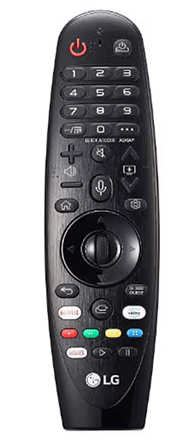
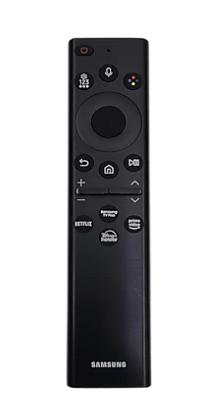
Winner: LG TV
Reason: In terms of ease of use and added functionality, LG’s Magic Remote and ThinQ app delivers a more streamlined and interactive experience compared to Samsung’s offering.
LG TV vs Samsung TV – Pricing and Warranty
When it comes to pricing, both brands offer a wide range of options to suit various budgets. Here’s how they compare;
LG TV
- LG provides a range of TVs, from affordable models to high-end OLEDs, with the OLED lineup being more expensive due to superior picture quality.
- LG TVs come with a one-year standard warranty and options for extended coverage of up to 3 years.
Samsung TV
- Samsung’s pricing is similar to LG’s, with a variety of models available at different price points, from budget-friendly to premium QLEDs.
- Samsung offers a 1-3 years warranty based on your TV model, providing customers with peace of mind.
Winner: LG TV
Reason: While both brands offer models across different price ranges, LG’s OLEDs tend to be pricier but offer superior quality, whereas Samsung’s QLEDs are more budget-friendly.
LG TV vs Samsung TV – Tech Support & Customer Assistance
Reliable customer support is an important aspect of any major purchase, especially when dealing with high-tech products like TVs. Both LG and Samsung provide a range of customer service options, but there are key differences.
LG TV
- You can reach out to LG Customer Service 24/7, except on national holidays.
- LG offers robust customer support, including phone assistance, live chat, mail, and a support page.
- Phone: 800-243-0000 or 850-999-4934
- Mail: lg.com/us/support/email
- Web Page: lg.com/us/support
- Their experts will respond to you within 1 or 2 business days.
Samsung TV
- Samsung support is available only from 8 AM to 8 PM on all 7 days.
- Samsung also offers comprehensive support through a website, live chat, phone assistance, and mail.
- Phone: 1-800-726-7864 or 800-726-7864
- Web Page: samsung.com/us/support
- Your request will be responded to within 24 hours of a working day.
Winner: Tie
Reason: Both LG and Samsung excel in customer support, offering multiple ways to seek help, making this category a tie between the two brands.
LG TV Vs Samsung TV – Which One to Choose?
Both LG and Samsung TVs bring unique strengths to the table. LG excels in picture quality and smart features, while Samsung stands out with its vibrant displays and user-friendly interface. The best choice depends on individual preferences, whether you prioritize gaming performance, design, or budget.
If you ask my suggestions, LG TV emerges as the superior choice for its advanced OLED technology, intuitive user interface, and exceptional audio quality, which collectively enhance the viewing experience.
As you consider your options, I encourage you to join my discussion forum to help you make an informed decision and improve your viewing experience.